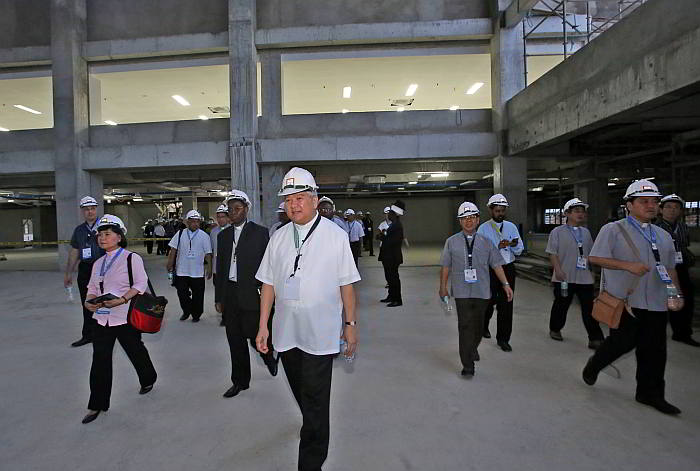CBCP to tackle polls, voters ed, drug menace in today’s assembly

CBCP President and Archbishop Socrates Villegas, (center) seen here during an inspection of the Eucharistic Pavilion in Cebu City last April 25, is eligible for reelection in today’s assembly.
AUTOMATED elections, voters’ education, the K-to-12 program and the illegal drug menace will be tackled in the three-day plenary assembly of the Catholic Bishops’ Conference of the Philippines (CBCP) which opened yesterday.
Fr. Marvin Mejia, who currently serves as CBCP secretary-general, said the bishops will also elect a new set of officers who will serve from December 2015 to 2017.
In a report published at the CBCP website, Mejia said president, Archbishop Socrates Villegas of Lingayen-Dagupan, and Vice President Archbishop Romulo Valles of Davao are eligible for a second term.
Both Villegas and Valles are in their first terms in office.
Newly appointed bishops Dennis Villarojo of Cebu City, and Oscar Florencio of Palo were also formally introduced as new members of the CBCP during the biannual plenary assembly at the Pope Pius XII Catholic Center in Manila.
Villarojo and Florencio were appointed auxiliary bishops of Cebu by Pope Francis last July 3.
Fr. Mejia said the bishops are set to meet with Commission on Elections (Comelec) chairman Andres Bautista to discuss issues regarding next year’s national elections.
Mejia said the bishops want to know the Comelec’s plan and clarify some questions regarding the conduct of the elections. Fr. Carmelo Diola of the Dilaab Foundation, will also present today its campaign to educate voters as well as candidates to make choices based on values.
“Yes, I will be presenting a report tomorrow (July 12),” Diola told Cebu Daily News.
Also invited to speak during the CBCP plenary assembly are DepEd Secretary Armin Luistro and Senate Minority Leader Vicente Sotto III.
Luistro is set to address queries pertaining to the K-to-12 program, while Sotto, who used to head the Senate Committee on Dangerous Drugs, will elaborate on the country’s problem with illegal drugs.
Disclaimer: The comments uploaded on this site do not necessarily represent or reflect the views of management and owner of Cebudailynews. We reserve the right to exclude comments that we deem to be inconsistent with our editorial standards.
